
by Legalnaija | Aug 13, 2021 | Uncategorized
Contemporary society’s concept of procreation, parental rights as well as child rights have proven to be an evolving continuum with the introduction of Surrogacy as one of the artificial reproductive techniques gaining acceptance in the absence of any legal framework regulating its existence and efficacy among contracting parties in Nigeria. This is another typical allusion where legal and ethical issues lag behind human innovation.
With surrogacy contracts, an infertile couple can rely on an alternative means to adoption, a method which has proven to be more effective than the cumbersome procedure associated with the latter in this part of the world.
Surrogacy contracts involves a tripartite contractual relationship with commissioning parents, the surrogate and a surrogate agency, acting as middleman for the former to secure a surrogate mother who agrees through artificial insemination to conceive, deliver and hand over the baby to the commissioning parents at birth.
The first popular judicial pronouncement on the subject matter of Surrogacy came to light in New Jersey (USA) in the case of Baby M in 1987.
In this case the surrogate mother refused to relinquish parental rights to the commissioning couple after delivery in 1986. Consequently, the commissioning parents contested the parental rights of the surrogate which was already waived by contract. The Supreme Court of New Jersey gave recognition to the surrogate arrangement between the parties, awarding legal custody to the commissioning parents on the rationale that the best interest of the baby was being considered among other things.
The concept of surrogacy has been an intrinsic human reality going back to the story of Abraham, Sarah who secured Hagar’s assistance in the procreation process, albeit biologically, today our legal jurisprudence in some part of the world recognises this medical intervention through, traditional surrogacy; a practice where the surrogate mother contributes genetically to the conception of the baby by a fertilisation of her own eggs via In-Vitro Fertilisation (IVF) (i.e. artificial insemination of the surrogate’s egg with the commissioning father’s semen)[i] and gestational or host surrogacy also known as rent a uterus: a practice where the surrogate mother does not contribute genetically to the conception of the baby. Here, the surrogate is strictly the carrier of the pregnancy. This means that a prior fertilised egg (embryo) is implanted into the uterus of the surrogate and the surrogate carries the pregnancy to full term.
No doubt this emerging trend is fraught with challenges from the perspective of the commercialisation of reproduction, social tussle over a child where the surrogate eventually withdraws from the original arrangement or breaches same all together, which more often, the commissioning parents usually have a stronger bargaining power over the surrogate in accessing judicial intervention or negotiating monetary settlement to possess the child in question, whilst keeping the surrogate at bay[ii].
Some countries like the United Kingdom, France, Bulgaria, Portugal, Italy, Germany, outrightly prohibit surrogacy. While countries like the USA, Canada or Australia, depending on the jurisdiction, allow it, providing for residency or citizenship for the commissioning parents and/or surrogate.
Notwithstanding, legal aspects[iii] of surrogacy hinge on a few central questions:
- Are surrogacy agreements enforceable, void, or prohibited? Does it make a difference whether the surrogate mother is paid (commercial) or simply reimbursed for expenses (altruistic)?
- What, if any, difference does it make whether the surrogacy is traditional or gestational surrogacy?
- Is there an alternative to post-birth adoptionfor the recognition of the intended parents as the legal parents, either before or after the birth?
In a society like Nigeria, where this practice is rarely overt, the surrogate is likely to be isolated once the news spreads in the community since it is in contradistinction with our cultural beliefs to approach procreational intervention through a third party, when a man has the option of being polygamous, in addition to the fact that the surrogate’s medical/obstetrics history is disclosed to the commissioning parents, infringing on the physician – patient confidentiality
With surrogate agencies[iv] emerging in Nigeria as registered companies or business entities, it is important to cover this human phenomenon through judicial pronouncements as well as legislations in consideration of enforceability of such contracts, ethical consideration on non-disclosure, whether it should be an option to legal abortion, import the concept of closed or open adoption to surrogacy, while policy makers should frame regulations sufficiently required to guide the practice of surrogacy in terms of addressing social mores, human rights, parental rights, child rights and intestacy rights (since the child is not the full blood of both parents) in Nigeria.
If ever you choose to resort to surrogacy, endeavour to engage the service of a family lawyer who has expert knowledge on this area of law, to draft a surrogate contract for you or review the contract emanating from the surrogate’s attorney or a surrogate agency, in order to adequately protect your interest and advice on the safety or otherwise of carrying it out in Nigeria or in a jurisdiction where it is recognised. I look forward to hearing from you (my contact details are in my Linkedin profile).
[i] http://www.ajmhs.org/article.asp?issn=2384-5589;year=2014;volume=13;issue=2;spage=105;epage=109;aulast=Umeora
[ii] The surrogate often times is a woman with weak economic means
[iii]en.wikipedia.org
[iv] Meet Surrogate Mothers Agency Limited is a popular example

Adeola Osifeko is a corporate-commercial lawyer with keen interest in Intellectual Property Law, Company Secretaryship and Emerging Practice Areas. She provides legal, business advisory and compliance services to startup companies, firms and non-profit organisations.
Adeola is also a writer and author, as a past time she facilitates for governmental and non-profit organisations.

by Legalnaija | Aug 12, 2021 | Uncategorized
The judicial powers of the Federal Republic of Nigeria are vested in the courts established by Section 6 of the Constitution of the Federal Republic of Nigeria 1999 (as amended). The courts are established for the primary purpose of resolving disputes amongst litigants who approach it for the determination of their civil rights and obligations.
There are three traditional arms of government, viz- the legislature, the executive and the judiciary. The legislature is that arm which is concerned with law making whilst the executive arm of government is concerned with the enforcement of laws and policies. The judiciary interprets laws and resolves disputes. Under the governmental doctrine of separation of powers, each arm of government is not expected to encroach into the activities of the other arms of government.
In the exercise of its constitutional role of dispute resolution, the courts resort to interpretation of existing laws and regulations which are applicable to that dispute. The courts interpret the laws made by the legislature and make pronouncements on the rights of the parties before it. In performing this duty of interpreting the law, the courts are expected to take particular care to ensure that it pronounces on the rights of only the parties before it. This is an inveterate doctrine that has taken root in our jurisprudence and the Supreme Court has emphasized in a plethora of cases that a court is not expected to make a pronouncement in favour of a person who is not before the court as a party/litigant or who was not given the opportunity of being heard.[1]
How Does the Supreme Court Make/Shape Policy?
It is necessary to emphasize as a preliminary point that the Supreme Court of Nigeria is the highest court in Nigeria and its decisions are binding on every person and authorities breathing the air in Nigeria.[2] Under our principle of stare decisis, or judicial precedence, the decisions of the Supreme Court of Nigeria are followed and obeyed by all subordinate courts in Nigeria.[3] Therefore, the pronouncements of the Supreme Court are not only meant for the benefit of the litigants who approach that court, but are also meant for the benefit of all Nigerians including the unborn generations whose rights may be likely affected by the reasoning and logic of the Apex Court. Therefore, although most of the points raised hereunder apply to almost all superior courts of record, the peculiar position of the Supreme Court as the highest court of the land (with nationwide territorial jurisdiction) places its decisions in a position to influence the policy of the entire nation over and above the decisions of the other subordinate courts.
- By Interpreting the Law
Under the principle of separation of powers in our jurisprudence, judges are expected to refrain from “making the law” in the process of adjudication of disputes as this is the exclusive preserve of the legislative arm of government. The Court of Appeal explained this duty with clarity in the case of Action Congress of Nigeria v. Rivers State Independent Electoral Commission & Ors (2013) LPELR-21169(CA) where the Learned Lord Jonah Adah JCA stated the law thus:
“It is trite that Courts do not make laws. They interpret laws. Courts cannot amend the constitution or any part thereof. There is no doubt that under our constitution, the three arms of government in both the Federation and the States are distinct and separate, and each has its functions and powers clearly set out. The judicial powers of the Federation and the States are vested in the Courts established for the Federation and the States respectively. Although the traditional function of the Courts is to interpret, uphold and pronounce what the law is and not what it ought to be, very often judges make useful comments in the course of interpreting a law which later turn out to influence an amendment to that law. See the cases of Global Trans. Oceanica S.A. v. Free Ent. (Nig) Ltd (2001) 5 NWLR (Pt.706) 426; and Asari Dokubo v. F.R.N. (2007) 12 NWLR (Pt. 1048) 320.”
As a corollary to the above, the Supreme Court makes and shapes policy when it is called upon to interpret certain provisions of the Constitution. This is because the route which a court takes when interpreting the provisions of our sacred and organic constitution is different from the route it takes when it is interpreting a mere statute. The Supreme Court explained this role in the case of Marwa v Nyako (2012) 6 NWLR (Part 1296) 199 when it held thus:
“When interpreting the Constitution, the court must bear in mind that it is dealing with an instrument which controls and regulates the powers and functions of government, controls the rights and obligations of the citizen and controls the peace and order of the society upon which the Constitution is supposed to operate. While in an ordinary statute the normal rule is that the terms used must be given the meaning they bore at the passing of the statute, a constitution is intended to be permanent and must be interpreted by looking at the past and according to present conditions in order to fulfil the object and true intent of the Constitution. A Constitution must therefore be interpreted and applied liberally. A Constitution must always be considered in such a way that it protects what it sets out to protect or guides what it set out to guide. By its very nature and by necessity, a constitutional document must be interpreted broadly in order not to defeat the clear intention of its framers.”
Therefore, it is clear that the court has a mandate to ensure that it interprets the provisions of the constitution in such a way that the fundamental rubrics of the society are protected. Although the administration of the country is the near-exclusive preserve of the executive arm of government, this country will also be governed by the pronouncements of the Supreme Court as the rights of every Nigerian would be affected by the interpretation which the Apex Court gives to various provisions of the Constitution; whether liberal or restrictive.
In interpreting the laws of the land and the Constitution, the courts employ several canons of interpretation. Ordinarily, courts are enjoined to make use of the literal rule of interpretation when construing statutes. This is the ground rule. A court of law is meant to give statutes their literal and unambiguous meaning where same is clear.
However, there are times when the intentions of the draftsperson of a law (including the Constitution) is obfuscated and the courts may have to jettison the literal rule of interpretation and adopt other modes of interpretation. It is in the exercise of these constructive modes of interpretation that the policy-making role of the Supreme Court is emphasized. One of the canons of interpretation which accentuates the policy-making role of the Apex Court is the purposive rule of interpretation wherein the courts embark on a jurisprudential odyssey to unveil the unclear purpose for which a legislation was enacted. In doing so, the courts shape (judicial) policy by the application of this liberal rule which would be followed by the lower courts through the inveterate doctrine of stare decisis and also binding on all persons and authorities in Nigeria.
One of the popular instances in which the Supreme Court made use of the purposive rule of interpretation to shape judicial (and labour) policy in Nigeria is in the celebrated case of Skye Bank v Iwu (2017) 16 NWLR (Part 1590) 24 wherein the Apex Court applied this rule of interpretation in unravelling the hitherto ambiguous intention of the framers of the Constitution of the Federal Republic of Nigeria, (Third Alteration) Act (Act No 3), 2010. Prior to this decision of the Apex Court, Nigerians were unclear and confused as to whether there was an existing right of appeal to the Court of Appeal against certain decisions of the National Industrial Court which did not involve questions of fundamental human rights. The Constitution was unclear on whether such right of appeal existed and how it was to be exercised. Litigants who were aggrieved by certain decisions of the National Industrial Court were at loss on how to appeal against these decisions, and the Judges of the said National Industrial Court sometimes saw themselves as overlords of a final court whose decisions are not appealable in certain cases.
To further confuscate the problem, there were conflicting decisions of the Court of Appeal on this issue and there was a need for the Apex Court to step into the arena to clear the ambiguity for the benefit of our labour laws. The Court of Appeal then stated the case of Skye Bank v Iwu to the Apex Court for it to resolve this jurisdictional dilemma.[4] In resolving the forensic issues case stated to it, the Supreme Court refused to share its primacy with the National Industrial Court and held that all decisions of the National Industrial Court of Nigeria are appealable to the Court of Appeal; as of right in matters involving complaints of fundamental rights, and with the leave of court in all other matters. The decision of the Supreme Court in this case of Skye Bank v Iwu helped shaped both labour and judicial policy in the Country. The Learned Justices of the Apex Court who delivered this judgment were mindful of the fact that the National Industrial Court was established to cater for the labour and industrial needs of the Country. Hence, the Apex Court did a fine job in balancing the need for speedy dispensation of justice in labour related disputes and also the need to protect the rights of access to court and fair hearing of litigants who approach the National Industrial Court.
- By Enthroning Substantial Justice
The Supreme Court being the Apex Court in the land is clothed with jurisdiction to determine cases which are of general public interest and capable of shaping the policy of the country or of making policy for the country. The Justices of the Supreme Court wield a special power that enable them to give decisions/judgments that is capable of determining the rights of other Nigerians who are not even before the Court as litigants. For example, in the locus classicus case of Savannah Bank v Ajiloh (1989) 1 NWLR (Pt 97) 305, despite the fact that the forensic dispute at the Supreme Court was between Savannah Bank of Nigeria and David Oni-Orisan on the one hand and Ammel O. Ajilo and Ammels Photo Industries Ltd on the other hand, the Supreme Court essentially determined the rights of millions of Nigerians who hitherto owned statutory interests in land in Nigeria and also shaped the land registration policy which governed the rights of millions of Nigerians who would acquire interest in land in Nigeria after that decision was given.
Consequently, as a result of the far-reaching effect of the decisions of the Supreme Court, the Justices of the Apex Court have always been advised to ensure that they give effect to the enthronement of substantial justice at all times. In the case of Engineering Enterprises Contractor Company of Nigeria v Attorney General of Kaduna State (1987) 2 NWLR (Pt. 57) 381, the Noble Lord Kayode-Eso JSC observed as follows:
“One stream that permeates through all these decisions, and I hold the view that this is a good sign for the administration of justice in this country, is the clear, unadulterated water filed with great concern for the justice of the case. The signs are now clear that the time has arrived that the concern for justice must be the overriding force, and action of the court. I am not saying that ex debito justiciae, by itself is a cause of action, it is to be the basis for the operation of the court, whether in the interpretative jurisdiction or the basic attitude towards the examination of a case.”
The Nigerian Apex Court has adopted with commendable approval, the opinion of the erudite English Jurist, Lord Denning MR, in his book, Family Story, where he postulated at page 174 as follows:
“My root belief is that the proper role of a judge is to do justice between the parties before him. If there is any rule of law which impairs the doing of justice, then it is in the province of the judge to do all he legitimately can to avoid that rule – or even to change it – so as to do justice in the instant case before him. He need not wait for the legislature to intervene because that can never be of help in the instant case. I would emphasize however, the word ‘legitimately’ the judge himself subject to the law and must abide by it.”
Hence, there are instances where the Apex Court can choose to ignore a purported rule of law which would hinder the enthronement of substantial justice, and in doing so, they compel the legislature to make drastic amendments to the law which would favour the polity. A classic example is the decision of the Apex Court in the case of Amaechi v INEC (2008) 5 NWLR (Pt. 1080) 227 which prompted the National Assembly to introduce drastic reforms to the Electoral Act vide an amendment.
- Judicial Review
Similarly, the judiciary is imbued with the power of judicial review. The courts have the inherent power to strike down the provisions of any legislation or custom that is not in conformity with the constitution in the exercise of its interpretive jurisdiction. This exercise of judicial review is tantamount to policy making, as the decisions of the courts shape the lives of millions of Nigeria. For example, in the case of Mojekwu v Mojekwu (1997) 7 NWLR (Part 512) 283, the Court of Appeal struck down a rampant customary law in Eastern Nigeria which hitherto prevented females from inheriting the estate of their deceased fathers. In that case, the Noble Lord Niki Tobi JCA (as he then was) shaped the customary law policy of Nigeria when he held as follows:
“A court of law, being a court of equity as well, cannot invoke a customary law which is repugnant to natural justice, equity and good conscience. The “Oli-ekpe” custom is one of such customs as it permits the son of the brother of a deceased person to inherit the property of the deceased to the exclusion of the deceased’s female child.” (P. 305 @ paras. D-E)
This decision of the Court of Appeal was upheld and affirmed by the Supreme Court in the latter case of Mojekwu v Iwuchukwu (2004) 11 NWLR (Part 883) 196 thereby effectively outlawing this customary practice.
In addition, the Apex Court also exercises its power of judicial review over certain actions of the executive arm of government and shapes policy in doing so. For example, the Supreme Court was notorious for striking down certain ouster clauses in military decrees during the tumultuous decades of military administration in Nigeria, which has now formed the bedrock for the protection of the fundamental right of access to court which is now available to every Nigerian.
- Political Doctrine/Political Tendencies
It is trite that the Judiciary is constitutionally empowered to checkmate the overzealous excesses of the other arms of government. The level of seriousness at which the judiciary would perform this checkmating function can be directly traced to the attitude which the Apex Court approaches such issues. For instance, the Apex Court made it clear by its decision in the cases of Inakoju v Adeleke (2007) 4 NWLR (Pt. 1025) 423 and Governor of Ekiti State & Ors v Prince Sanmi Olubunmo & Ors (2017) 3 NWLR Part 1551 Page 1 that the judiciary would no longer sit by and watch while some rogue elements in the legislature and executive respectively attempt to turn the law on its head or hijack a lacuna in the law to achieve an illegal or immoral purpose.
Prior to the decision in Inakoju v Adeleke (Supra), the courts were shy to dabble into matters dealing with the removal of a governor or deputy governor from office due to the ouster clause in Section 188 (10) of the Constitution and the earlier decisions of the Court of Appeal on this issue. This gave the members of some states Houses of Assembly the imprimatur to resort to all sorts of political trickery and gimmicks in order to remove a sitting Governor from office because they knew such activities would be unchecked by the judiciary. However, the Supreme Court in Inakoju v Adeleke refused to have any of this and laid down the principle that any legislative exercise which purports to impeach a sitting governor or deputy governor from office must be done in strict accordance with the law else the Courts will intervene and set same aside notwithstanding the ouster clause in Section 188 (10) of the Constitution. This decision had a tremendous effect on governance as it has shaped legislative policy against any arbitrary exercise of the powers of checks and balances under Section 188 of the Constitution. The Noble Lord Niki Tobi JSC remarked, quite commendably, in his leading judgment as follows:
“The Legislature is the custodian of a country’s Constitution in the same way that the Executive is the custodian of the policy of Government and its execution, and also in the same way that the Judiciary is the custodian of the construction or interpretation of the Constitution. One major role of a custodian is to keep under lock and key the property under him so that it is not desecrated or abused. The Legislature is expected to pet the provisions of the Constitution like the way the mother pets her day-old baby. The Legislature is expected to abide by the provisions of the Constitution like the way the clergyman abides by the Bible and the Iman abides by the Koran. And so, when the Legislature, the custodian, is responsible for the desecration and abuse of the provisions of the Constitution in terms of patent violation and breach, society and its people are the victims and the sufferers? and in this particular context, the Oyo State society and the respondents, particularly the third respondent. Fortunately, society and its people are not totally helpless as the Judiciary, in the performance of its judicial functions under section 6 of the Constitution, is alive to check acts of violation, breach and indiscretions on the part of the Legislature. That is what I have done in this judgment. I do hope that this judgment will remove the apparent wolf in the appellants as members of the House of Assembly of Oyo State.”
Similarly, in Governor of Ekiti State & Ors v Olubunmo & Ors (Supra), the Apex Court descended heavily on the executive arm of government when the Ekiti State Governor had purported to sack all constitutionally created Local Government Councils in Ekiti State replaced them with caretaker committee whilst relying on Sections 23B(i) and (ii) of the Ekiti State Local Government Administration (Amendment) Law, 2001 as the justification for his action. The Supreme Court in condemning this affront on the Constitution vouchsafed the inviolability of the provisions of Section 7(1) of the Constitution which provides for democratically elected local government councils. Therefore, by virtue of this decision of the Apex Court, no governor can purport to sack any democratically elected local government council in his state for any reason whatsoever without drawing the ire of the judiciary.
The attitude of the Apex Court in descending heavily on the other arms of government in cases like Inakoju and Olubunmo has set down a policy which guides these other arms of government that every exercise of their powers to checkmate the excesses of one another must be done with utmost fealty to the spirit and intendment of the Constitution.
Some Justices of the Apex Court have also unsuccessfully tried to shape (electoral) policy by their dissenting decisions. The recent Imo State and Zamfara State Supreme Court review cases wherein the Applicants in those cases had approached the Supreme Court to review its earlier decision on appeals emanating from the elections conducted in those states are classical examples. The decisions of the Supreme Court have always been immutable since time immemorial and the Apex Court has always been reluctant to review or set aside its own decision which it has earlier given, no matter the extenuating circumstances. However, the Noble Lord Chima Nweze JSC had dissented in both cases, and held on to the view that the Supreme Court should be able to review its earlier decision where it made an apparent error. The dissenting opinions of the Noble Lord Nweze JSC although unpopular at this time, may form the bedrock for a future change in electoral policy in Nigeria. The purpose of such dissenting opinions is to strengthen our law and the administration of justice.
Conclusion
The Justices of the Apex Court must ensure to always be guided by judicial restraint when exercising their policy making roles in the discharge of their duties. Many jurists are of the opinion that the democratic process and legislative enactments which represent the will of the people should direct changes in policy and not judicial activism. Justices of the Supreme Court (and other courts) are appointed and not elected. Hence they do not possess the sovereign will of the people unlike their counterparts in executive and legislative arm of government. However, the judges of the Court have a fundamental duty to right societal wrongs through their interpretation of the law.
This writer ultimately submits that the Justices of the Apex Court should be guided by the fundamental prescription that the Constitution being an organic document should be interpreted in the context of modern life and modern problems.
 Nonso Anyasi is a Lagos-based Legal Practitoner and can be reached via nonsoanyasi@nigerianbar.ng
Nonso Anyasi is a Lagos-based Legal Practitoner and can be reached via nonsoanyasi@nigerianbar.ng
References
[1] Please see the cases of Alhaji Mudashiru Kokoro-Owo & Ors v. Lagos State Govt & Ors (2001) LPELR- 1699 (SC) and Comrade Mike Alioke v. Dr. Victor Ike Oye & Ors (2018) LPELR-45153(SC).
[2] See Section 281 (7) of the Constitution of the Federal Republic of Nigeria 1999 (as amended).
[3] Aghedo v Adenomo (2018) 13 NWLR (Pt. 1636) 264.
[4] Ordinarily, there is no right of appeal to the Supreme Court over cases emanating from the National Industrial Court, hence, the need to state case this matter to the Apex Court for an effective final determination of the constitutional issue involved.

by Legalnaija | Aug 10, 2021 | Uncategorized

To grow your law practice, you have to be everywhere a potential client may look for you, including online directories, and our Lawyer Directory can be extremely effective. Our legal directory focuses on listing lawyers for the purpose of making it easy for potential clients to search and find a lawyer through their location, area of practice and gender.
The benefits of subscribing to the Directory includes;
- Online visibility for your law practice
- Helps with your Search Engine Optimization
- Helps build trust with clients
- Helps clients find you
- Helps other lawyers who need referrals or collaborations in your jurisdiction.
To take advantage of these benefits, you can subscribe to the Legalnaija Directory by following these simple steps;
- Log on to https://app.legalnaija.com/signup
- Create an account
- Fill in your details, attach any relevant documents and submit for verification (Note that you will not be listed if you do not complete your profile and submit the requested documents for verification).
- You will be notified of your approval and listing via email.
More exciting is that you get a 30 day free trial when you sign up. Note that subscription is 1,000 Naira only monthly, and you have the opportunity to upgrade and become top listed in your location as well. If you have signed up and are also yet to complete your profile and get verified, you should do so now.
Hurry clients are waiting to find you right now!!!
For more information, contact support at hello@legalnaija.com or via @Legalnaija across your social media platforms.
www.legalnaija.com
WhatsApp – 09029755663

by Legalnaija | Aug 8, 2021 | Uncategorized
To grow your law practice, you have to be everywhere a potential client may look for you, including online directories, and our Lawyer Directory can be extremely effective. Our legal directory focuses on listing lawyers for the purpose of making it easy for potential clients to search and find a lawyer through their location, area of practice and gender.
The benefits of subscribing to the Directory includes;
- Online visibility for your law practice
- Helps with your Search Engine Optimization
- Helps build trust with clients
- Helps clients find you
- Helps other lawyers who need referrals or collaborations in your jurisdiction find you

To take advantage of these benefits, simply subscribe to our Lawyers Directory by following these simple steps;
- Log on to https://app.legalnaija.com/signup
- Create an account
- Fill in your details, attach any relevant documents and submit for verification (Note that you will not be listed if you do not complete your profile and submit the requested documents for verification).
- You will be notified of your approval and listing via email.
Note that subscription is 1000 Naira only monthly, and you have the opportunity to upgrade and become top listed in your location as well. More exciting is that you get a 30 day free trial when you sign up.
If you have signed up and are also yet to complete your profile and get verified, you should do so now.
Hurry clients are waiting to find you right now!!!
For more information, contact support at hello@legalnaija.com or via @Legalnaija across your social media platforms.
@Legalnaija
www.legalnaija.com
WhatsApp – 09029755663

by Legalnaija | Jul 30, 2021 | Uncategorized

Famsville Solicitors is delighted to bring to you the Residency and Citizenship Series. This is a series which is aimed at giving you a leverage and insights into how you can, not only ‘japa’ to your desired country, but also to become a citizen of that country.
The maiden edition of this series is coming up on Monday, 2nd of August, 2021.
The topic is: ‘Securing Turkish Citizenship through Citizenship by Investment’.
Turkey is ranked as one of the best countries to live and work in the world. It has a good work-life balance, high standard of living, amongst other benefits.
Register and join us for this event to learn how to become a Turkish citizen through Citizenship by Investment and secure your future.
Registration link is: https://bit.ly/2VxBOLL
Meeting ID: 827 0711 6674
Password: 888882
See you!
#legalnaija #calltobar2021 #nigerianlawyers #immigrationlawyer #japa #naija #relocating #relocation #nigerianyouths #famsville
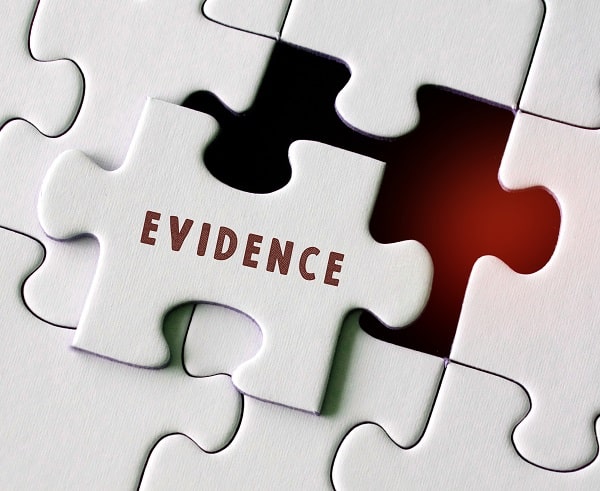
by Legalnaija | Jul 28, 2021 | Uncategorized
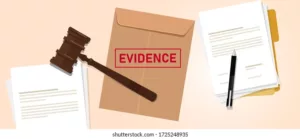
INTRODUCTION.
A Court decides a case on only admissible evidence tendered and admitted before it. When parties and their Counsel prepare for trial, they make a checklist of the documents they intend to rely on and examine the admissibility of these documents. Some of these documents are public documents. A Public document is a vital document in discharging an evidential burden in litigation, hence proof of the contents of a public document is important. Section 102 of the Evidence Act, 2011 provides what a public document is, and proof of such public documents is done by either by producing the document itself, that is the original copy (primary evidence, see section 86 of the Evidence Act, 2011) or by producing a certified true copy of the public document (secondary evidence, see Sections 87(a), 89(e) and 90(1)(c) of the Evidence Act, 2011).
When the original copy of the public document is in the possession of the party, there is no problem, however, when it is not, parties encounter difficulty in getting a certified true copy. Some of these difficulties range from the expense in certifying the documents, the delay in getting the document certified from the government institution which delays the trial of the case, and in worse case scenarios refusal to certify the document by the government institution. These creates some legal problems for parties and their Counsel. In finding a solution to the problem of getting a certified true copy, trial lawyers tender a photocopy of a certified true copy or subpoena the government official, and in cases of a trial by affidavit evidence or interlocutory applications, canvassed the argument that the document forms part of the affidavit so doesn’t need to be certified. These legal ingenuities have sometimes been rejected by the Court.
ANALYSIS OF THE DECISIONS OF THE COURT.
In the case of a photocopy of a certified true copy, there are conflicting authorities on whether such is admissible. The two leading authorities on this issue are the Supreme Court’s decision in Minister of Lands, Western Nigeria v. Dr Azikiwe (1969) ALL NLR 49 at 59 and Magaji v. Nigerian Army (2008) 8 NWLR (Pt 1089) 338 S.C. While the former stated that a photocopy of a certified true copy is not admissible in evidence, the latter stated that it is admissible. The ratio in Minister of Lands v. Azikiwe is that by the combined interpretation of the provisions of Sections 96(1)(e), (2)(c), 108 of the Evidence Act, 1945 now Sections 89(e) (f), 90(1)(c) and 102 of the Evidence Act, 2011 respectively, only a duly certified true copy of a public document is admissible in evidence and none other. While the ratio in Magaji v. Nigerian Army is that on the authority of Daily Times v. F.R.A Williams (1986) 4 NWLR (Pt 36) 536 and Iheonu v. Obiukwu (1994) 1 NWLR (Pt 332) 594 once a photocopy of a certified true copy has on the face of the document, all the requirements needed in Section 104 of the Evidence Act, 2011 (i.e., the name, seal, signature & title of the officer that certified the document and proof of payment of legal fees) the document ought to be taking judicial notice of pursuant to section 122(1), (2)(e) and (j) hence admissible in evidence.
Until this issue is revisited and confirmed by the Supreme Court, it would be risky for a Counsel to tender a photocopy of a certified true copy in evidence as the trial Court may rule either way. Counsel may also pray to the Court to return the document for recertification in the interest of justice if the Court is of the opinion that a photocopy of a certified true copy is not admissible in evidence. The Court in carrying out its duty to do substantial justice can order the documents to be recertified, see Tablik Investment Limited v. GTB (2011) 17 NWLR (Pt 1276) 240.
The other mode where the government official in possession of the document is subpoenaed has also hit a brick wall, which is the narrow interpretation of section 90(1)(c) of the Evidence Act, 2011 by the Supreme Court in Araka v. Egbue (2003) 17 NWLR (Pt 848) 1. The facts of the case were that the Appellant’s witness testified that he was representing the Principal Secretary to the Executive Governor of Enugu State who was subpoenaed to tender documents in the court. After laying the necessary foundation that the original of the public document is lost, went on to tender the evidence wherein an objection was raised because it was not certified. The trial Court overruled the objection and admitted it into the evidence. The Court of Appeal set aside the ruling, holding that only a certified true copy is admissible notwithstanding that the original public document is lost so there is no way it could be certified.
On further appeal to the Supreme Court, the Appellant argued that section 97(2)(c) [now section 90(1)(c)] should be interpreted to accommodate a situation where the original of a public document is lost and cannot be found or destroyed and is no longer in existence. The apex Court rejected the argument and stated that the phrase ‘no other secondary evidence is admissible’ in section 97(2)(c) means that it is only under that section that a secondary evidence of a public document can be admissible in evidence and no other section of the Evidence Act.
This narrow interpretation will cause a lot of problems. In view of current realities, an example is the vandalization and arson on the Lagos division of the High Court of Lagos State and the Lagos Magisterial District of the Magistrate Court of Lagos State. A lot of vital documents were burnt making it difficult if not impossible to obtain the certified true copy of those public documents. In another scenario, what if the public institution who has custody of such a document is also the adverse party whom the evidence is intended to be proved against. The public institution can simply state that the document is lost or cannot be found. What this means is that it cannot be admissible under Section 89(a) (i) &(ii) of the Evidence Act, 2011. That is injustice! It does not accord with the duty of the Court to do substantial justice. Where the literal interpretation of a statute will lead to injustice, the Court is meant to explore other rules of interpretation of statutes. See Ugwu v. Ararume (2007) 12 NWLR (Pt. 1048) 365. It is impermissible to construe sections in isolation. See Marwa and Ors v. Nyako (2012) 6 NWLR (Pt 1296) 199 (SC), Elelu-Habeeb v. A-G, Federation (2012) 12 NWLR (Pt 1318) 423; I.N.E.C. v. Musa [2003] 3 NWLR (Pt. 806) 72, 102; A.T. Ltd. v. A.D.H. Ltd [2007] 15 NWLR (Pt. 1056) 118, 166-167. The phrase ‘no other secondary evidence is admissible’ should not be interpreted in isolation. A holistic interpretation should be resorted to in order to arrive at the intention of its framers. Marwa and Ors v. Nyako (supra).
The proper interpretation of section 90(1)(c) is that it does not exclude other events where the document can be admissible. A case where such an interpretation was given is in Anagbado v. Faruk (2019) 1 NWLR (Pt 1653) 292 S.C where the Supreme Court held a document that was meant to be in law a public document as a private document on the fact that it was tendered and admitted without objection by the opposing party. Contrast against Onwuzuruike v. Ezodiem (2016) 6 NWLR (Pt 1508) 215 S.C where it was held as a public document.
The rigid and narrow interpretation by the Court in Araka v. Egbue may not stand the test of time and ought to be revisited by the Supreme Court.
In cases of a trial by affidavit evidence or interlocutory applications, the usual argument canvassed is that the document forms part of the affidavit so doesn’t need to be certified. This has received judicial validation in the cases of B.A.T Nig. Ltd v. Int Tobacco Co. Plc (2013) 2 NWLR (Pt 1339) 493 C.A and Ilorin East Local Govt. v. Alasinrin & Anor. (2012) LPELR-800. However, this is not a blanket authority to circumvent the need to certify a public document. The Supreme Court’s decision in Fawehinmi v. I.G.P (2000) 7 NWLR (Pt 665) S.C 525 is that under section 97 of the old Evidence Act (now section 90) there is no distinction in proceedings instituted by other processes other than writ of summons and those instituted by writ of summons, hence only a certified true copy of the public document attached to the affidavit will be admissible if the document seeks to prove the truth of a particular deposition in the affidavit. While in Jukok International Limited v. Diamond Bank Plc (2016) 6 NWLR (Pt 1507) 106-107 it was held that if the public document is not in dispute it need not be certified.
CONCLUSION.
The rationale for only a certified true copy of a public document being admissible as a secondary evidence is to verify the authenticity of such documents. However, each case should be treated on its own peculiar fact, so the general rule in section 90(1)(c) should accommodate some exceptions under other sections of the Evidence Act. If the facts of the case are not peculiar, then the general rule should be applied.

Adewale Sontan is a legal practitioner and has a keen interest in dispute resolution. He is a Counsel in various litigation proceedings involving corporate institutions, individuals and government agencies. He can be contacted via sontanadewale@gmail.com
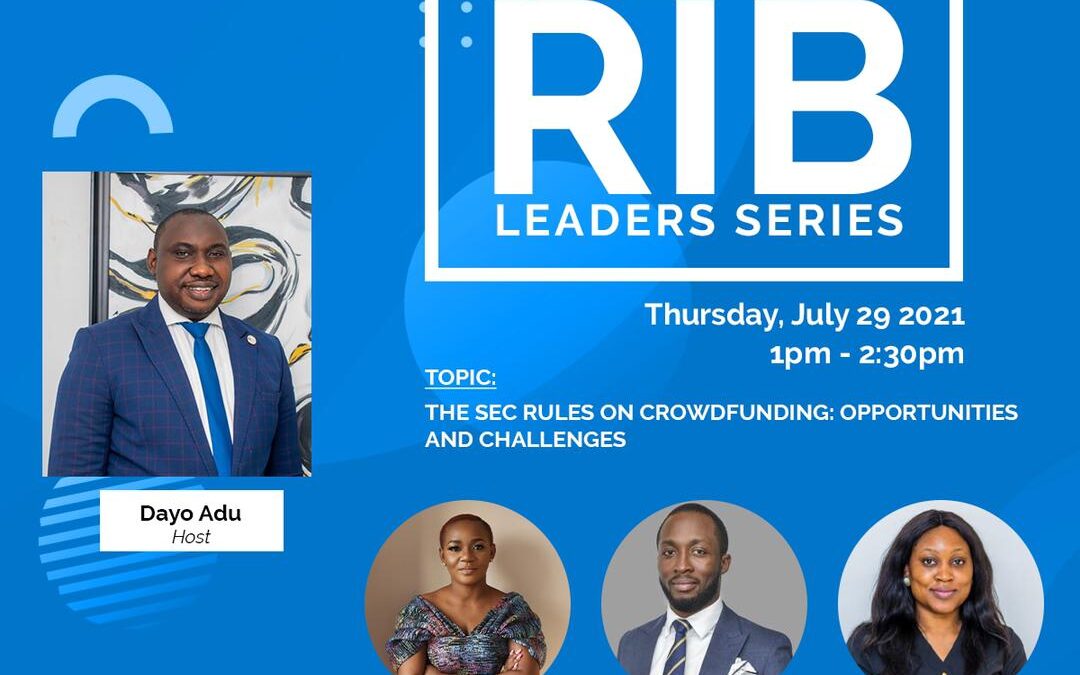
by Legalnaija | Jul 27, 2021 | Uncategorized
Famsville Solicitors is pleased to specially invite you to her maiden edition of the Regulatory Innovators and Business (RIB) Leaders’ Series. The RIB Leaders’ Series is a platform that brings together regulators, innovators, business leaders and professionals across various disciplines to discuss salient issues impacting on the Nigerian economy.
The maiden edition of this series is scheduled to hold on Thursday, 29 July, 2021 between 1 pm and 2:30 pm via zoom.
The Zoom meeting link is: https://us02web.zoom.us/j/85121330618?pwd=RDFDYTdqUWY0TDJ4aVRITEduQmlhZz09
The discussion will centre on “the Securities and Exchange Commission Rules on Crowd Funding: Opportunities and Challenges.”
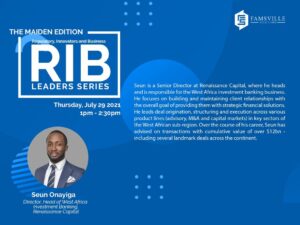
Panelists are:
Mr. Emomotimi Agama,
Head, Registration, Exchanges, Market, Infrastructure and innovation, Securities and Exchange Commission
Seun Onayiga – Head, West Africa, Renaissance Capital
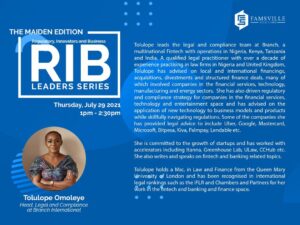
Tolulope Omoleye – Head, Legal and Compliance, Branch International
Azizah Abiola – Head, Legal Department, Cardinal Stone
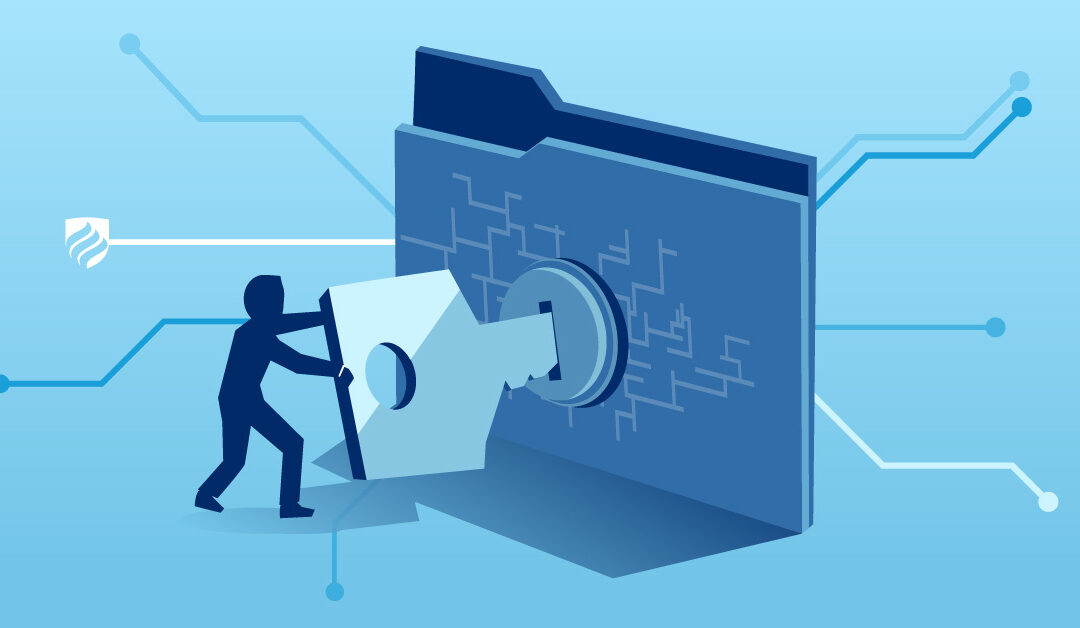
by Legalnaija | Jul 25, 2021 | Uncategorized

Not even at the height of the myth of Pegasus was Pegasus more devastating than it is now – not even in the battle that killed the monster Chimera. Pegasus may be merely regarded as a Greek myth but in present day, however, it is the most sophisticated spyware built to keep surveillance on its target in a manner hardly detectable or preventable by the safest of systems.
Built on the so called ‘Zero-click technology’, Pegasus poses the most significant challenge yet to cyber security experts and systems, making a mockery of the iOS and Android Operating Systems, regarded and indeed which pride themselves as the best and most secure privacy-ensuring Operating Systems.
Cyber Attacks and the Myth of Cyber Security
Cyber security refers to the practice of defending computers, servers, mobile devices, electronic systems, networks, and data from cyber-attacks. It entails the application of technologies, processes and controls to protect systems, networks, programs, devices and data from cyber-attacks with the aim of at least, reducing the risk and exposure of a device to cyber-attacks whilst protecting against the unauthorised exploitation of systems, networks and technologies.
On its part, a cyber-attack is regarded as any attempt to steal, alter, expose, destroy, or gain any information from a person/organisation through unauthorized access and by the use of one or more computers against a single or multiple computers or networks. It is the gaining or an attempt to gain illegal access to electronic data stored on a device or a network. Cyber-attacks are on the rise and there are several types of them which a system can be subjected to.[1]
Amongst cyber security experts, there is unanimity in the knowledge that the implementation of cyber security does not guarantee full protection from cyber-attacks. However, the implementation provides reasonable safeguards, some of which are regarded as more or less impenetrable.
Certain Operating Systems are built on this and are claimed to be the safest and incapable of penetration by cyber attackers. For instance, Apple claims that its iPhones are the safest and most secure mobile device in the market due to its tried and trusted iOS which undergoes constant upgrade. Google’s Android OS is not far off either. These systems are designed to ensure that people feel safe and are guaranteed of their privacy and security from spying or surveillance when using their mobile devices. Indeed, that is the aim of cyber security and data protection laws, the world over.
Enter, Pegasus…
The narrative would begin to change in 2016 after a failed attempt to install the Pegasus spyware on an iPhone belonging to a human rights activist leading to an investigation. Between 2016 and 2021, Pegasus spyware has attained unprecedented sophistication and can now be installed on any device – primarily mobile devices – without any interaction with the owner of the device thanks to the ‘Zero-click technology’.[2] Common vectors of the Pegasus spyware are SMS, WhatsApp, iMessage, Calls, etc. and once installed on a device, it gathers data from the affected device and communicates same to the attacker.
To put things in perspective, once installed, Pegasus can have access to all SMS, Emails, call logs, photos, videos, location, contacts and chats of the victim as well as activate the victim’s microphone and camera such that it records the audio and visual communication of the victim for transmission to the attacker – all these undetectable by the device’s owner.
Pegasus attack targets a device’s “zero day” vulnerabilities[3] obtaining the device’s ‘root privileges’ or ‘administrative privileges’ in the process. It is also said that once a device has been infected, Pegasus has more control over it than the owner of the device.[4] The effect of an attack on a device’s zero day vulnerability is that even where the manufacturer is able to identify and remedy those flaws; the attacker is able to exploit new flaws. This has led to the assertion that the manufacturers only try to get better while the attackers get worse.
Besides the foregoing, there are others attributes of Pegasus that make it the world’s most feared spyware: Pegasus is effective across all Operating Systems, self-destructs when it is unable to connect to the server after sixty days of installation or when installed on a wrong device and at present, almost impossible to prevent or detect.[5]
Pegasus and Cyber Security
While cyber security is broad and meanders around infinity, there are certain minimum cyber security tips owners of devices are expected to keep in order to keep their devices reasonably safe from cyber-attacks. Some of the tips are regular update of devices when updates are available, use of password managers to avoid password attacks, use two-factor authentication, giving serious thoughts and consideration before downloading Apps or clicking a link and using a VPN App especially when using a public WiFi. These safety tips are designed to protect devices from common types of cyber-attacks.
Rather unfortunately, Pegasus spyware, whilst being a form of malware attack is not a common attack and is unpreventable by any of the above tips. Its ‘zero click’ feature chides these tips which are rather more effective against password and social engineering attacks. Several assessments have shown Pegasus by-pass the iOS 14.0 and other updated versions of the iOS.[6] It would appear that at present, cyber security is helpless in the face of Pegasus’ advance. Asked how to prevent a Pegasus attack, Claudio Guarnieri of Amnesty International’s Security Lab retorted that: “the real honest answer is nothing”.
Pegasus and Data Protection Laws
Data Protection entails cyber security. It is the end product of cyber security as data cannot be protected in this digital age without cyber security. As a concept, data protection seeks to provide minimum regulatory and/or organizational standards for the protection of the personal data of natural persons.
In Nigeria, the Nigerian Data Protection Regulation, 2019 (“the NDPR) caters for this. The EU General Data Protection Regulation (“the GDPR”) bulwarks against data breach in the EU and is seen as the standard. Both the NDPR and the GDPR define personal data in such terms as to include the location data, footage, names, email addresses, phone numbers and indeed anything capable of identifying a natural person (data subject).[7] These personal data indicators are essentially what Pegasus targets when it infects a device. It thus goes without saying that a successful Pegasus attack is a breach of both the NDPR and the GDPR. What is more, processing of personal data using Pegasus cannot be fitted into any of the lawful basis for processing under both the NDPR and the GDPR.
A question may arise as to whether the NDPR, nay the GDPR applies in situations of Pegasus attack given that the processing of personal data of the victims of the attack is itself unlawful since consent was not obtained. Prima facie, the processing is unlawful and criminal. However, it is to prevent such attacks that the NDPR and GDPR was formulated, underlying the application of the NDPR.[8]
A caveat to the foregoing, however, is when Pegasus is used to attack a corporate organization. Certain remedies may lie to such organizations and the attack may well constitute a crime under relevant cyber-crime laws. However, it does seem that such an attack cannot constitute a breach of the NDPR or the GDPR as organizations are not data subject under these regulations.
Perhaps, the point should be made that the Pegasus spyware is developed by an Israeli tech company, the NSO Group to help nations combat terrorism. At present, the spyware is sold for hundreds of millions of United States Dollars only to countries, meaning that it is not in the possession of individuals.[9] However, Pegasus has been shown to be used by state actors for espionage and political surveillance. According to a Washington Post, three serving Presidents, seven former Prime Ministers (some of whom were serving at the time of the attack) and one King have been targeted with Pegasus.[10] This is a particularly dangerous act of espionage given the capabilities of Pegasus and ultimately offends data localization principle.
National Security and use of Pegasus
Under the NDPR, personal data can be processed for public interest without the need for consent. By Article 2.5 of the Guidelines for the Implementation of the NDPR in Public Institutions, processing of personal data for national security is an exemption to the requirement for consent. It seems that the aggregate of the NDPR and the Guidelines is that processing can be done even without the consent of the data subject where it is necessitated by public interest and national security.
However, the NDPR does not contemplate the surveillance of data subjects. Rather, the NDPR only allows for the processing of personal data irrespective of the consent of the data subject in cases where this exception applies. Consequently, provision is not made for the criminal gathering of personal data by surveillance, spyware or phishing. In fact, use of Pegasus to obtain personal data of individuals will constitute a crime under Section 32 of the Cyber Crimes (Prohibition) Act, 2015 which criminalizes acts of phishing and spamming.
However, in a country where the government is actively in pursuit of perceived criminals, one would not be surprised to learn of the deployment of the Pegasus spyware on journalists, agitators and political opponents alike.
To conclude, the Pegasus spyware poses the most significant threat to cyber security in modern day. Somewhat sadly, it seems it will take some time for experts to lay a grip on it while for its users, it will only mean attacking other vulnerabilities. The die is cast and cyber security appears to finally be realizing that it is not the king after all.
 Abraham is an Associate at the Firm of Solola & Akpana. He is a member of the Firm’s Data Protection Compliance and Dispute Resolution Practice Groups. He is also a member of the Firm’s Corporate/Commercial Practice Group providing a wide range of legal representation and advice to a broad spectrum of clients in the Oil and Gas, Banking/Finance, Fintech and private sectors on various transactions and regulatory compliance.
Abraham is an Associate at the Firm of Solola & Akpana. He is a member of the Firm’s Data Protection Compliance and Dispute Resolution Practice Groups. He is also a member of the Firm’s Corporate/Commercial Practice Group providing a wide range of legal representation and advice to a broad spectrum of clients in the Oil and Gas, Banking/Finance, Fintech and private sectors on various transactions and regulatory compliance.
He has several articles on data protection/privacy law, international law and Intellectual Property Law published in his name and has routinely audited and filed data audit reports on behalf of several multinational and national companies in Nigeria, to NITDA.
He obtained his LL.B from Ambrose Alli University, Ekpoma and was called to the Nigerian Bar in 2019. He also holds a certification in Data Protection.
Abraham particularly has data protection, intellectual property, sports/entertainment law and fintech as his niche whilst also excelling in dispute resolution.
Reach Abraham at abrahamaigba@gmail.com; 08131993172
[1] Common cyber-attacks are malware attacks, phishing attacks, denial of service attacks, man in the middle attack, social engineering attack, password attack, etc.
[2] What this implies is that without as much as the owner of the device clicking a link, downloading an App or answering a call, Pegasus can be installed on the device
[3] Zero day vulnerabilities refers to an Operating System’s flaws either not yet known to the manufacturer or which the manufacturer is yet unable to rectify
[4] https://amp.theguardian.com/news/2021/jul/18/what-is-Pegasus-spyware-and-how-does-it-hack-phones (last accessed on July 21, 2021)
[5] To detect whether a phone has been infected with Pegasus or not, the phone is sent for digital forensic cyber security lab analysis, which of course is a luxury in Nigeria
[6] https://www.washingtonpost.com/technology/2021/07/19/apple-iphone-nso/ (last accessed July 22, 2021)
[7] See Articles 1.3 and 4.1 of the NDPR and GDPR respectively
[8] It would be rather naive to imagine that the attackers will present for compliance with the NDPR/GDPR. But as the attackers, at present at least, are governments/government institutions or at least government-linked, compliance with the NDPR may well be an issue particularly when the information/data is declassified.
[9] True as this may be, sight should not be lost on the fact that these countries are represented by individuals. What has been with Pegasus is that rather than being used against terrorists, it has been used to attack journalists, human rights activists and opposition figures by heads of countries. Its deployment has been more in misuse than in use. More so, it cannot be claimed that Pegasus has only been sold to governments; certain individuals have been able to lay hold of the spyware.
[10] https://www.washingtonpost.com/world/2021/07/20/heads-of-state-pegasus-spyware/ (last accessed July 22, 2021)

by Legalnaija | Jul 18, 2021 | Uncategorized
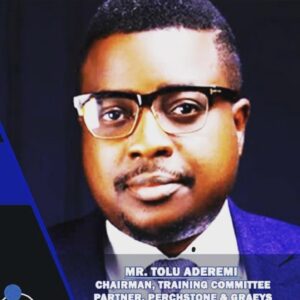
Weeks after the passing of the Petroleum Industry Bill (the Bill) by the National Assembly, discussions remain rampant on the provisions of this Bill and how suited it is in realizing the core objectives centered on fostering sustainable prosperity in the Host Communities, enhancing peaceful and harmonious co-existence between licensees or leases and Host Communities as well as supporting the development of the Host Communities in particular, and the country in general.
Speaking on the “Conversation with Oluwakayode” a Radio Programme on Lagos Talks 91.3fm on Saturday, July 17 2021, Mr. Tolu Aderemi, an Oil and Gas Expert and a Partner at Perchstone and Graeys LP, one of the leading commercial Law Firms in the country, shared his expert opinion on the harmonization process of the Bill, its expected outcome and the impact on the Host Community.
The journey to what we now have as the Bill could be traced back to the Oil and Gas Reform Committee (OGRC) constituted during the General Olusegun Obasanjo administration. However, in 2008 Late General Umaru Yar’dua took the bold step by introducing the Bill to the National Assembly. It is quite alarming that after 13 (Thirteen) years, 3 (Three) Presidents and 4 (Four) Assembly, this Bill remains a subject of tactical negotiation and strategizing as the Host Communities remain unsatisfied.
Commenting on whether the Bill can be rightly described as a game changer, Mr. Tolu Aderemi, stated that the Bill is an ambitious one that has attempted to compress 16 legislations into one document. He further stated that not only is this ambitious, but also has the tendencies to be counterproductive because a careful consideration of the Industry challenges and issues that have arisen from the several legislations have not been addressed.
Some of these legislations he referred to are the Petroleum Profit Tax Act (PPTA) on the issue of taxation and The Deep Offshore and Inland Basin Production Sharing Contract Act 2019 as amended on the Investment Tax Credit (ITC) which has been a subject of several arbitration cases.
On the question of how the Bill has been able to manage the different industry issues arising from the harmonized legislations, Mr. Tolu Aderemi stated that the Bill has not done bad at all because looking at where we are coming from and where we are now as a country, there has been a great improvement in the light of the provisions on Governance and the Host Communities.
He stated that part of the problems we have had as a country in this sector is the absence of regulatory clarity as on one hand, players in the industry do not know who the regulators are and on the other hand, they know that it is the Department of Petroleum Resources (DPR), but it is generally conceived and rightly so that the DPR is saddled with many responsibilities that needed to be broken down into different parts. This issue, he pointed out has been addressed by the Bill, more so excellently by breaking down our regulatory infrastructure into the Upstream Regulatory Commission and an Authority, regulating the midstream and downstream sector.
According to him, we cannot categorically say that these are without their challenges but to a greater extent these challenges are surmountable, as the Bill has now made the issue of issuance of licenses and taxation clearer. It has also reduced the bottleneck.
Speaking on the administration of the Bill, Mr. Tolu Aderemi stated that the Bill has introduced a new structure for the Nigerian National Petroleum Corporation (NNPC) – the big Elephant in the room by transitioning into an entirely commercial entity to be known as NNPC Limited. This entity, according to him will run like Chevron, Shell, and Exxon Mobil of today. It is going to compete favorably in the local and international market and to show the confidence that Government intends this to be a full commercial entity, it is going to have shares that will be held by the Ministry of Finance and how they are to be transferred will be under stringent condition.
He further stated that the question of what becomes of the Assets and Liabilities of NNPC has also been addressed in that, those that are not inimical will be moved to the new entity while the ones that are inimical will become the liability of the Federal Government. However, he pointed out that one of the shortcomings is the absence of an Asset Management Company just like we have in the Power Sector with the introduction of the Nigerian Electricity Liability Management LTD/GTE, an entity capitalized by government that warehouses liabilities.
Furthermore, Mr. Tolu Aderemi stated that NNPC has subsidiaries that cut across the entire value chain. We have NPDC (Nigerian Petroleum Development Company Ltd), the Petroleum Development arm of the Corporation that addresses exploration, exploitation and production; Nigerian Engineering and Technical Company going together with Integrated Data Services that deals with the seismic part of the business; PPMC (Pipeline and Product Marketing Company); Refineries including the Kaduna, Port Harcourt and Warri Refineries and also a company called Duke Oil which also cats as a player within a player in the market.
According to Mr. Tolu Aderemi, NNPC Ltd will be a full-blown company that will operate as the existing International Oil Companies (IOCs), capable of going abroad to borrow funds and can bid and be regulated like every other company.
He stated that NNPC Limited will also sell crude oil on behalf of the federal government for a fee and even though acting on behalf of the federal government, it is not unusual as the provisions of the current Petroleum Act and the Deep Offshore Act allow private companies to conduct petroleum operations on behalf of government.
He also stated that there would be a limited ministerial influence on the NNPC limited. Thus, the current structure of the NNPC limited positions it to be commercially oriented and we do not expect anything less in terms of commercial efficiency and effectiveness.
Commenting on what the Bill has introduced towards ameliorating the development in the South-South, Mr. Tolu Aderemi pointed out that the question of ownership of oil has always been rested as by virtue of Section 1 of the Petroleum Act, the entire ownership of oil is vested in the Federal Government of Nigeria who holds it on behalf of the people of Nigeria. According to him, this ownership structure is distinct from the structure in America that embraces individual ownership structure with the incidence of tax payment to the American Government.
He further stated that the importance of the Host Communities come from the consequence of the operations of the IOCs in terms of the environmental impact. Thus, our question and major concern as far as these Host Communities’ issues are concerned is a question of how these environmental hazards and hardship meted out to the Host Communities can be mitigated.
Furthermore, he succinctly stated that the Government in 1960 set up what was known as the Niger Delta Development Board for the purpose of dealing with environmental concerns. Similarly, UNPADEC and Niger Delta Development Commission (NDDC) were set up in 1992 and 2000 respectively. There was also the introduction of the 13% derivation percentage. Thus, according to him, the question remains one of accountability, as the Bill cannot resolve these environmental challenges overnight because reactively, success can only be achieved as we move on with the implementation of the Bill.
Mr. Tolu Aderemi also stated that there is a progressive departure from what used to be 5% of interest in the asset, a policy introduced during the President Goodluck Ebele Jonathan’s regime that was capable of driving away business in this country because, despite the fact that the Host Communities will own 10% equity (a combination of assets and liabilities) and will be entitled to 10% in the event of profit share, the problem arises when a cash call is made, a call which requires the Host Communities to pay 10% to the companies. The question now is where and how the host Communities can get this money when there has been no adequate accountability and transparency.
Joining him in the conversation was Mr. Malachi Ugonmadu, a Lawyer and former president of the Committee of the Defence of Human Rights. Mr. Malachi in addressing the question of whether the 3% is enough for the Host Communities and whether the Bill should have done better, stated from the socio political angle that, if our law as it stands today vests ownership of petroleum in the state as against the American system of government that embraces individual ownership, more so as we emulated the federal government system from America, then Nigeria has a dysfunctional federalism and this further fortifies the call for restructuring.
Conclusively, Mr. Tolu Aderemi stated that the Bill made up of 5 (Five) Chapters, 319 (Three Hundred and Nineteen) Sections and 8 (Eight) Schedules is a purposeful one. Thus, commenting on his part, he stated that 0% of 100 is not the same as 1% of 100. And looking at the books of an Oil Company and their operating expense that runs into billions of dollars, the 3% we are talking about is almost the budget of a state in Nigeria and so our focus should be centered more on the administration, management, accountability and transparency of these resources.

by Legalnaija | Jul 17, 2021 | Uncategorized

Law books are the life line for lawyers, law firms, law researchers and law students. The importance of law books cannot be overemphasized, and on the Legalnaija online book store, we have a list of books that would boost your law practice and help build your law library, all of which are readily available on our online store.
A – Z Of Sports Law
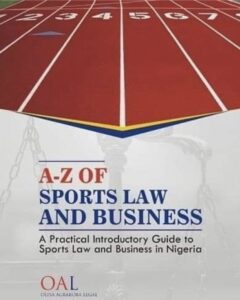 ₦2500
₦2500
The A to Z of Sports Law and Business is a comprehensive and bite-sized industry guide book for lawyers and non-lawyers to all the major hot topics you need to know in the sports industry.
A Force of Justice (A book in honour of Hon. Justice Oguntade)
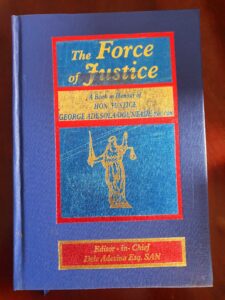
₦25000
This book was published in honour of Hon. Justice Oguntade JSC (RTD) in 2010. It focuses on some of the landmark cases where Justice Oguntade either delivered the leading judgment or a dissenting judgment subjecting them to critical review and comprehensive assessment in well articulated and researched essays by the contributors.
Contributors include over 24 Senior Advocates and other distinguished Legal Practitioners and Professors, including; Professor Yemi Osibajo SAN, Professor Taiwo Osipitan SAN, Chief Wole Olanipekun SAN, Kola Awodein SAN, Professor Oyelowo Oyewo SAN, Dr. Alex Iziyon SAN, Chief Bolaji Ayorinde SAN, Kemi Pinheiro SAN, Tayo Oyetibo SAN, Dr. Babatunde Ajibade SAN, Professor Ayo Atsenuwa, Dr Olisa Agbakoba SAN. Etc
Babalola’s Law Dictionary (2nd Edition)
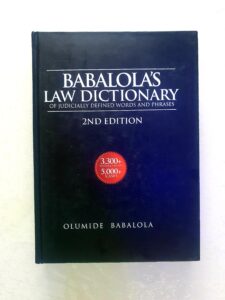
₦5000
Babalola’s Law Dictionary Of Judicially Defined Words And Phrases (2nd Edition) lists over 3300 definitions and cites over 5000 cases. The Dictionary remains a must have for every lawyer, law firm and law student.
Casebook On Data Protection
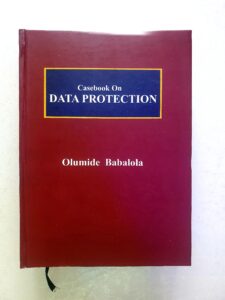
₦20000
The book is divided into fourteen chapters. After an introduction that traces the brief history of data protection in Nigeria, separate chapters are devoted to Definitions, Relationship with other rights; Principles of Data Protection; Exceptions and Derogation; Employment Data; Sensitive Data; Transfer of Data to a Foreign Country; Liability of Data Controllers; Data Subject’s Rights; Data Breach; Remedies; Data Property Rights; Supervisory Authority and Appendices that feature the Nigeria Data Protection Regulation and the NDPR Implementation Framework.
Casebook On Human Rights Litigation In Nigeria
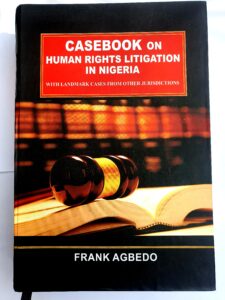
₦20000
Human rights litigation in Nigeria is the latest book on Human rights by Frank Agbedo, author of the popular law books, Rights of Suspects and Accused Persons and Human Rights Litigation in Nigeria.
This book focuses on a compilation of leading cases on all salient legal principles and issues affecting fundamental rights enforcement in Nigeria.
This book painstakingly addresses the predicament of lawyers and judges in accessing relevant cases of interest, by providing and updating the practitioners with a comprehensive collection of (both current and locus classicus) reported cases mainly from decisions of the Supreme Court and Court of Appeal, on all notable issues of law and procedure relating to human rights litigation in Nigeria.
Every chapter presents you with a gamut of leading cases on fundamental issues and principles on enforcement of fundamental rights of citizens under our laws, etc, namely;
- The meaning, definition, and classification of fundamental rights.
- Limitations to enforcement of fundamental rights.
- Commencement of Action for enforcement of fundamental rights.
3( i) Who may sue for enforcement of fundamental rights.
3(ii) Whetter the Constitutional right to life of a deceased can be enforced by his/ her dependents.
3(iii) Whetter an Application can be filed by more than one person for the enforcement of fundamental rights.
- The liability of a Public Officer who allows himself to be used by a citizen to commit illegality such as debt recovery or settlement of civil claims.
- Whether every citizen is duty-bound to report the commission of an offence to the Police and the corresponding duty of the Police to investigate it.
6.Whether both the High Court and Federal High Court have concurrent jurisdiction to entertain and determine Fundamental Rights Application.
7.Condition Precedent to the exercise of the Court’s jurisdiction in an Action for enforcement of fundamental rights.
8.The right of an Applicant to Compensation and Damages in an action for the infringement of his fundamental rights.
9.Whether the Socio-economic rights provided in Chapter II of the constitution are totally nonjusticiable in Nigerian Courts.
- Landmark cases from other jurisdictions.
Dark Hearts (Hard Cover)

₦4500
Dark Hearts is a collection of gripping short stories based on actual court cases that will get you thinking, gaping, puzzled and wondering about the realities of the dark side of life. This compilation provides rare insights into the criminal mind.
Human Rights Litigation In Nigeria: Law, Practice And Procedure
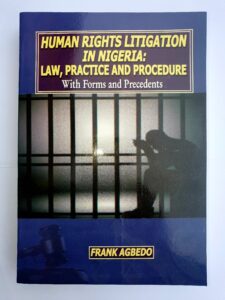
₦8000
This book is written by Mr. Frank Agbedo, one of Nigeria’s leading authors in human rights literature and jurisprudence.
Principal features of the book include but are not limited to the ABC of human rights litigation, an in depth analysis of the new FREP Rules 2009, A review of judicial attitude to enforcement of Fundamental Rights Cases, Prosecuting Appeals in Fundamental Rights Cases, The status of public interest litigation in Nigerian Courts, The Role of Amici Curae in human rights litigation, the justiciability or judicialisation of socio-economic rights in Nigerian Courts and the future of human rights litigation. The book also features a comprehensive package of practice forms and precedents relating to practical applications for enforcement of fundamental rights, as well as a comprehensive index of cases and relevant statutes.
Practice forms and precedents
The book is almost a ready answer to all issues and matters relating to preparation, initiation, filing and prosecution of fundamental right cases in Nigerian Courts. The book is comprehensive enough to the cover of the field of human right law, practice and procedure and which could be better described as a One-Stop-Shop in human rights litigation.
International Arbitration Law And Practice: The Practitioners Perspective
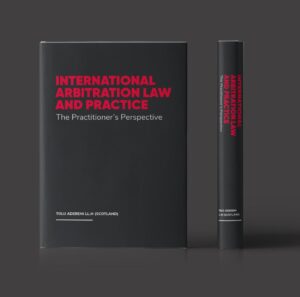
₦10000
Edited by: Tolu Aderemi
The Practitioners Perspective” is one book every arbitration practitioner or student should have.
The Book is a compendium of scholarly papers that focus on contemporary topics which will deepen the practice of arbitration; whether at a junior or mid-Senior level. This book is a valuable resource tool for Arbitration Practitioners and is a welcome contribution to the body of knowledge on the topic in Nigeria.
The book which is edited by Tolu Aderemi, Partner, Perchstone & Grays, is also a compilation of articles by seasoned international arbitration practitioners from both within and outside the Nigerian legal jurisdiction including very eminently qualified and senior Arbitration practitioners such as Kamal Shah (UK), Funke Adekoya SAN, Dr. Babatunde Ajibade, SAN, Adedoyin Rhodes-Vivour SAN, Hon. Justice Nnamdi Dimgba, Tunde Fagbohunlu SAN, Osaro Eghobamien SAN, BOLAJI AYORINDE SAN, FCArb., O.F.R., Bode Olanipekun, SAN, Tunde Busari, SAN, FCIS, FCIArb, @Ikponwosa Omigie (Company Secretary, NAPIMS), Prof Alero Akeredolu, Funmi Roberts and Prof Olawuyi.
This book is a valuable resource tool for Arbitration Practitioners and is a welcome contribution to the body of knowledge on the topic in Nigeria.
Journal Of Current Law And Arbitration Practice (Vol 1, No.2)
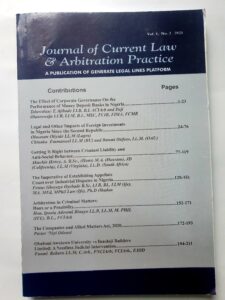
₦5000
Articles in this Volume include:
- The Effect of Governance On The Performance Of Money Deposit Banks In Nigeria.
- Legal And Other Impacts Of Foreign Investments In Nigeria Since The Second Republic
- Getting it Right Between Criminal Liability And Anti – Social Behaviour
- The Imperative Of Establishing Appellate Courts Over Industrial Disputes In Nigeria
- Arbitration In Criminal Matters: Hoax Or Possibility
- CAMA 2020
- OAU vs. Onaolaji Builders Limited: A Needless Judicial Intervention
50 in stock
LAW FOR THE LAYMAN
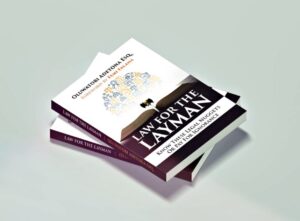
₦3000
Law for the Layman is a book aimed at promoting legal literacy in Nigeria by bridging the gap between YOU and the LAW using the simplest language easy for comprehension in an entertaining style coupled with interesting cases and first-hand experiences from the lens of a legal practitioner.
Legal Rights And Obligations Under Nigerian Laws (Ebook)
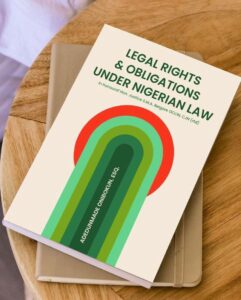
₦2500
This book educates the average Nigerian and visitor on Nigerian laws. It contains explainers on over 80 Nigerian laws for the benefit of the reader. The Hard Cover copy of this book is sold for N3,000 (Three Thousand Naira).
Metamorphosis; Tales By A Lawyer Girl
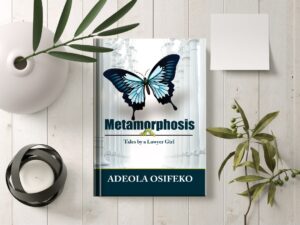
₦2800
A fascinating and entertaining book, one that exposes the challenges of young professionals, in this case a young lawyer and her drive for success.
New Developments In Law And Practice In Nigeria
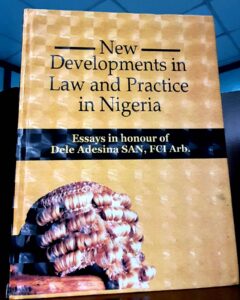
₦20000
This book examines a wide array of topical and contemporary areas of law and Practice, which include the following subjects: The Constitution; Administration of Justice; Practice and Procedure; Corporate Law including tax; Shipping Investment, arbitration, money laundering, insolvency issues; Intellectual property, media, and the Legal profession, among others.
RIGHTS OF SUSPECTS AND ACCUSED PERSONS UNDER NIGERIAN CRIMINAL LAW

₦6000
The book in a painstaking manner dwells on the fundamental rights of citizens, with particular reference to the rights of suspects and defendants as guaranteed by the Constitution of Nigeria, the Penal Code and some International Charters and Instruments which have been ratified by Nigeria. Major highlights include (a) The rights of a Suspect before and after Arrest by security agents, (b) Rights of a Suspect/Defendant during trial before a Court of Law, ( c) The Duties of the State/Prosecution in Criminal trials, (d) Defences available to an Accused person/Defendant during trial, (e) Rights of suspects/ Convict after trial, (f) Rights of Suspects in Prison Custody, (g) Legal remedies against rights violations, (h)Obstacles to effective Criminal Justice Administration in Nigeria, (i) Criminal Justice reforms, (j) Domestication of International Covenants on Human rights, (k) Appendixes of relevant laws. etc, etc.
Social Media For Lawyers

₦2500
This book helps lawyers, and law firms can harness social media resources to boost clientele, establish their reputations in niche practice areas and advance their legal careers.
Author- Adedunmade Onibokun
The Employment Law Handbook
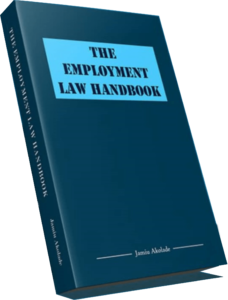
₦15000
The Employment Law Handbook is written to fill a gap identified in the nature of texts on Employment and Labour Law in Nigeria. While there are many well-researched books on the general principles of Labour and Employment Law, there is a dearth of quick reference materials for Human Resource Managers and Legal Practitioners who have to grapple with taking decisions and advising on workplace related issues on a daily basis. This need is accentuated by the rapid changes in this area of the Law in recent years.
This book provides answers to most of the frequently asked questions on Employment and Labour Law, contains a synopsis of all Employment and Labour Law related legislations as well as selection of precedents.
The Nigerian Electricity Market; Understanding The Transactional, Legal & Policy Issues

₦35000
The books aims at giving industry participants all the necessary negotiating tools as they engage in the complexities within the power sector in Nigeria. The books discusses licenses, agreements, and regulations that operate within the power industry space.
Understanding Petroleum (Oil & Gas) Transactions and the Nigerian Market

₦50000
There have been several policies in the Petroleum industry such as those related to local content and domestic gas supply obligations. This book provides a clear Insight about executing transactions, obtaining licenses and other complex issues industry participants encounter.
Visit the law shop now on www.legalnaija.com/shop
Or social media @Legalnaija
Or via Whatsapp/Text/Call on 09029755663

 Adeola Osifeko is a corporate-commercial lawyer with keen interest in Intellectual Property Law, Company Secretaryship and Emerging Practice Areas. She provides legal, business advisory and compliance services to startup companies, firms and non-profit organisations.
Adeola Osifeko is a corporate-commercial lawyer with keen interest in Intellectual Property Law, Company Secretaryship and Emerging Practice Areas. She provides legal, business advisory and compliance services to startup companies, firms and non-profit organisations.

 Nonso Anyasi is a Lagos-based Legal Practitoner and can be reached via
Nonso Anyasi is a Lagos-based Legal Practitoner and can be reached via 













 Abraham is an Associate at the Firm of Solola & Akpana. He is a member of the Firm’s Data Protection Compliance and Dispute Resolution Practice Groups. He is also a member of the Firm’s Corporate/Commercial Practice Group providing a wide range of legal representation and advice to a broad spectrum of clients in the Oil and Gas, Banking/Finance, Fintech and private sectors on various transactions and regulatory compliance.
Abraham is an Associate at the Firm of Solola & Akpana. He is a member of the Firm’s Data Protection Compliance and Dispute Resolution Practice Groups. He is also a member of the Firm’s Corporate/Commercial Practice Group providing a wide range of legal representation and advice to a broad spectrum of clients in the Oil and Gas, Banking/Finance, Fintech and private sectors on various transactions and regulatory compliance.



 ₦2500
₦2500















